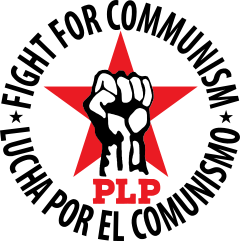Progressive Labor Party (United States): Difference between revisions
More languages
More actions
(Ultraleftism) Tag: Visual edit |
No edit summary Tag: Visual edit |
||
| Line 1: | Line 1: | ||
{{Infobox political party|name=Progressive Labor Party|logo=Logo PLP.svg|founded=January 1962|abbreviation=PLP|newspaper=''Challenge''|political_orientation=[[Maoism]]|website=www.plp.org}}{{Communist Parties}} | {{Infobox political party|name=Progressive Labor Party|logo=Logo PLP.svg|founded=January 1962|abbreviation=PLP|newspaper=''Challenge''|political_orientation=[[Maoism]]|website=www.plp.org}}{{Communist Parties}} | ||
The '''Progressive Labor Party''' ('''PLP''') is an [[Ultra-leftism|ultra-left]] [[communist party]] in the [[United States of America|United States]]. | The '''Progressive Labor Party''' ('''PLP''') is an [[Ultra-leftism|ultra-left]] [[communist party]] in the [[United States of America|United States]]. It is hostile to all other communist parties and [[Socialist state|socialist states]].<ref name=":122" /> | ||
== History == | == History == | ||
Latest revision as of 12:55, 17 March 2025
Progressive Labor Party | |
|---|---|
 | |
| Abbreviation | PLP |
| Founded | January 1962 |
| Newspaper | Challenge |
| Political orientation | Maoism |
| Website | |
| www.plp.org | |
| Part of a series on |
| Communist parties |
|---|
The Progressive Labor Party (PLP) is an ultra-left communist party in the United States. It is hostile to all other communist parties and socialist states.[1]
History[edit | edit source]
The PLP was founded by leftists expelled from the CPUSA around 1960. It identified with China and initially supported the Vietnamese and Cuban revolutions. It was a leading force in the progressive student movement of the 1960s.[1]
The PLP became increasingly dogmatic and sectarian throughout the 1960s. It sided with the ultra-left of the Cultural Revolution in China and attacked the Black Panthers, Students for a Democratic Society, and the Cuban and Vietnamese revolutions. In 1969, it took over the SDS. It eventually isolated itself from all other foreign and domestic progressive groups.[1]
References[edit | edit source]
- ↑ Jump up to: 1.0 1.1 1.2 Albert Szymanski (1977). Critique of Ultra-Leftism, Dogmatism and Sectarianism. https://archive.org/details/critiqueszymanski/mode/1up.
